Understanding Canine Teeth to Make Decisions about Keeping or Removing will be shared by Bedental through the following article in 2023, let’s learn together!
Understanding Canine teeth to make decisions – What are the Canine Teeth?
Canine teeth are the third teeth counting from the back in our dental arches. In terms of shape, canines teeth are sharp and pointed. Functionally, they are used for biting and tearing food.
Aesthetically, canine teeth add emphasis to the dental arch, making the smile more charming. However, some misaligned canines teeth can cause the dental arch to become crooked, unattractive, and aesthetically compromised.
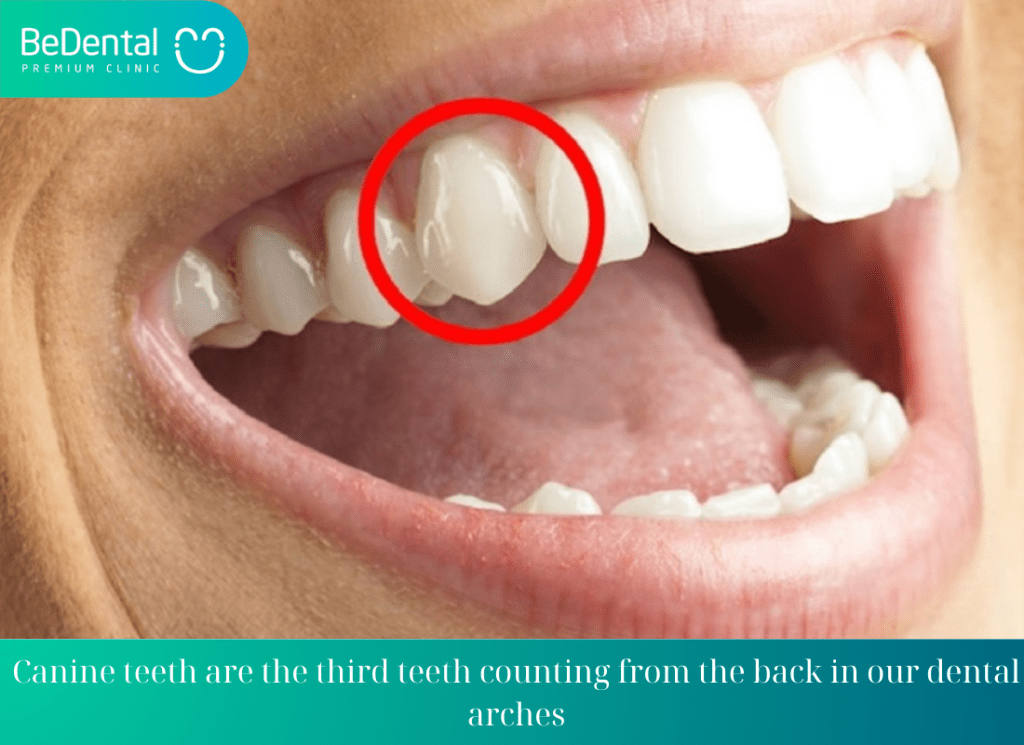
Typically, an adult’s dental arch will have up to 4 canines teeth, with 2 upper canines and 2 lower canines. However, the number of teeth can vary from person to person, and not everyone will have all 4 canines.
Canines teeth are also divided into two types: milk teeth and permanent teeth. For children who are in the process of losing their baby teeth, the milk canines will naturally fall out. However, if it is a permanent canine tooth, it will not be replaced.
The positioning of Canine Teeth
In adults, the permanent dentition consists of 32 teeth evenly distributed in the upper and lower jaws. In each quadrant of the mouth, there are two incisors, one canine, two premolars, and three molars.
According to the International Dental Federation (FDI), we have a diagram of the four quadrants of the permanent dentition as shown in the figure above.
See more: What is white tounue disease?
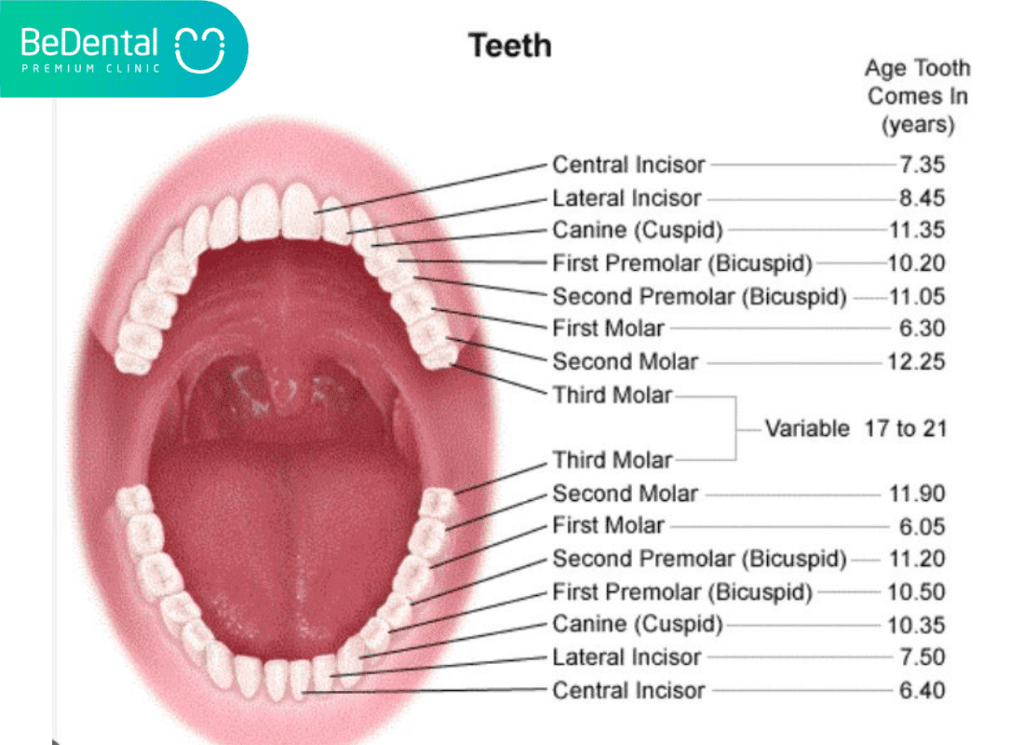
Canines teeth in humans are positioned as the third tooth counting from the incisors of each jaw, facing each other. According to the dental arch map, the canines are numbered as the third position. Canines teeth have a unique structure and are among the few teeth that hold the most pivotal positions in the dental arch.
Shape of Canine Teeth
Being located at the junction between the anterior teeth and the posterior teeth, the shape of canines teeth also exhibits some overlap and transition. The shape of canines teeth is half like the incisors and half like the premolars. The body of the canine tooth is thick like an incisor but thinner than a premolar. The chewing surface of the canine tooth is different from the incisors, lacking deep grooves like the premolars, but it has the sharpness of the premolar and is also as long as the edge of the incisor.
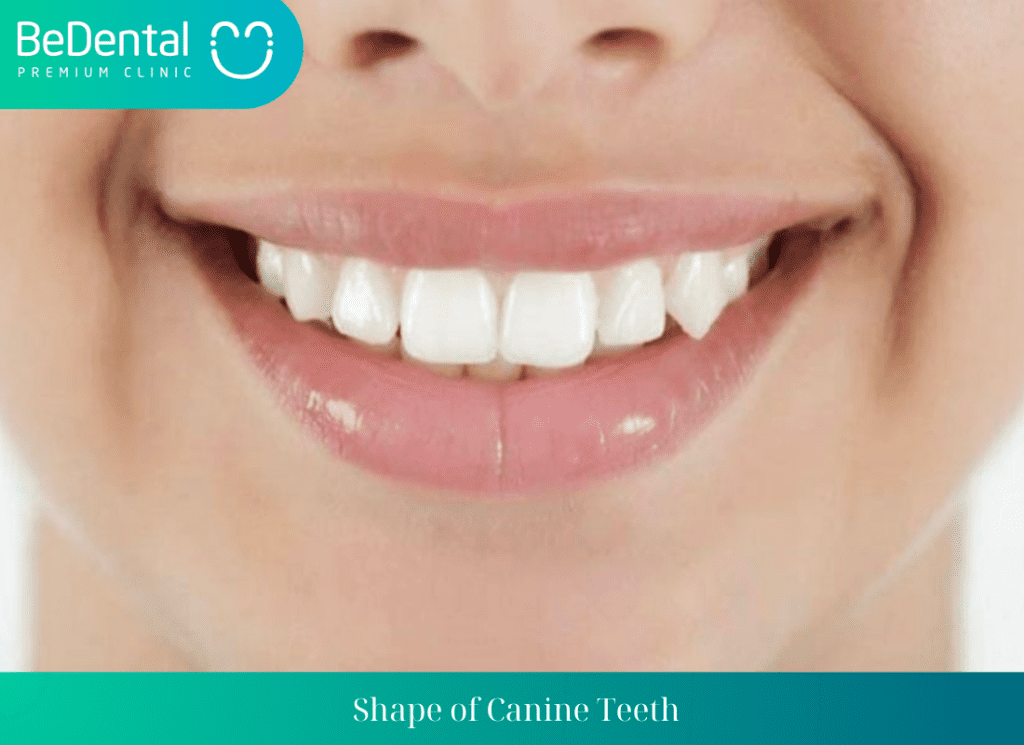
Structure of Canine Teeth
The structure of canines teeth is based on the natural tooth structure and includes the following components:
- Enamel is the outer covering of the tooth, composed of 96% inorganic material, 3% water, and 1% organic material. Enamel is considered the hardest substance in the body.
- Dentin is located beneath the enamel and consists of 70% inorganic material, 20% organic material, and water. Dentin is relatively softer, has a yellowish color, and contains a majority of the tooth’s dentin.
- The dental pulp contains numerous nerve fibers, blood vessels, and connective tissue of the tooth. The pulp carries nutrients to nourish the tooth. A tooth typically has about 1-4 root canals.
- Because the enamel and dentin of canines teeth are similar, they are thinner than the teeth located further back in the mouth. Canines teeth have one root and one root canal.
- Canines teeth are the most stable teeth in the corner of the jaw. They are held securely in place by the mechanism of self-cleaning.
Canine Teeth Function
- Canine teeth play an important role in aesthetics and assist in chewing food. Canine teeth have high resistance to strong forces during chewing and act as a heavy-duty reaction mechanism. They help mitigate potential dangers and reduce excessive impact from vertical forces in the eccentric movements of the lower jaw with the group of teeth.
- Canines teeth are located at the four corners in the four quadrants of the dentition, which can be considered as the support points of the dental arch, contributing to shaping and lifting the facial muscles.
- Canine teeth have an important role in adjusting the movements of the lower jaw sideways and forward, and they are also considered as “guideposts” for the bite joint.
Should Canine Teeth be Extracted?
The decision to keep or remove canines teeth will depend on each individual case. If you are fortunate enough to have canines that are considered beautiful and charming by many, you may choose to keep them as a unique feature of your smile, as not everyone has canines teeth.
In the second case, you should keep your canines teeth if they take up a significant amount of space in your dental arch, as removing them may impact your self-confidence. Additionally, canines teeth aid in the biting and tearing of food, so you should consider this before deciding to extract them.
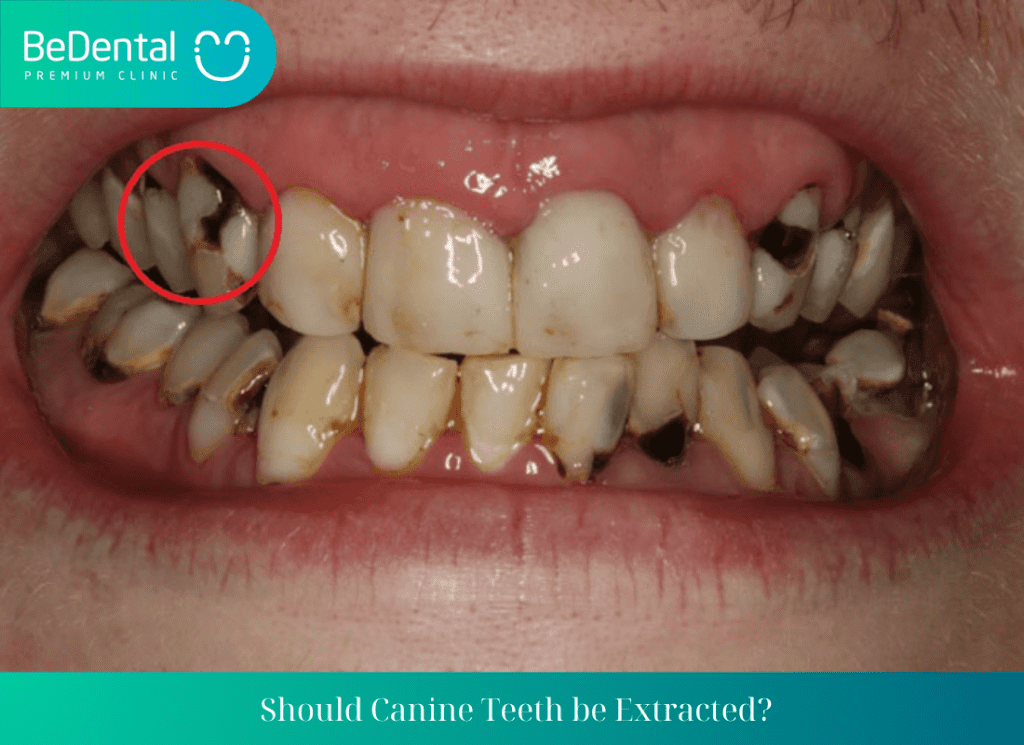
So in which cases should canines teeth be extracted?
- Firstly, if the tooth has severe decay or irreversible pulpitis.
- Secondly, if the tooth is impacted, growing in the wrong position, or protruding out of the jaw, causing pain and affecting facial aesthetics.
- Thirdly, if you want to have a symmetrical dental arch, resembling a corn kernel, you can seek advice from a medical facility regarding the extraction of canines teeth.
Early signs of canine tooth eruption
Typically, children will start to erupt their canines teeth between 16 and 22 months old, with the upper canines erupting first. During this teething period, there may be a high fever ranging from 38 to 39 degrees Celsius for a few days. During this stage, parents need to take proper care of the child’s oral hygiene, apply measures to reduce fever, etc.
Misaligned canines teeth can make oral hygiene difficult. During this phase, the erupting teeth can cause gum irritation, pain, and in some cases, infection-related oral diseases. Therefore, parents need to pay special attention and early detect if the child has impacted or malpositioned canines.
See more: Gum disease and 3 factors to recognize
Interpreting the Fate of people with canine teeth
Men with prominent canine teeth are often seen as intelligent and successful. Their long canine teeth human signify capability and decisiveness in work and life matters. However, arrogance, which is sometimes associated with individuals possessing sharp canine teeth, can lead to interpersonal challenges. This highlights the importance of maintaining humility and charm, especially since canine teeth human lion are symbols of strength and dominance.
If men feel their canine teeth sharp or protruding canine teeth detract from their smile, they may seek advice on how to make your sharp canine teeth less prominent or explore cosmetic options like canine teeth veneers or titanium canine teeth for added aesthetic appeal.
Women with pointy canine teeth are often meticulous and adept at managing both social and domestic responsibilities. Thanks to their sharp human canine teeth, they have a striking smile that leaves a lasting impression. However, overconfidence linked to long human canine teeth may make it difficult to navigate romantic relationships smoothly.
For those who wish to soften their look, options such as how to make your canine teeth less sharp or canine teeth cleaning near me for polishing are popular choices. Additionally, canine teeth cleaning no anesthesia services are available for those who prefer a pain-free experience during routine maintenance.
How to achieve natural-looking canine teeth
In recent years, canines teeth have become a trend among young people. Many individuals aspire to have canines teeth to create a focal point on their faces. Here are some simple ways to achieve the most natural-looking canines teeth.
Simple methods to create canine teeth at home.
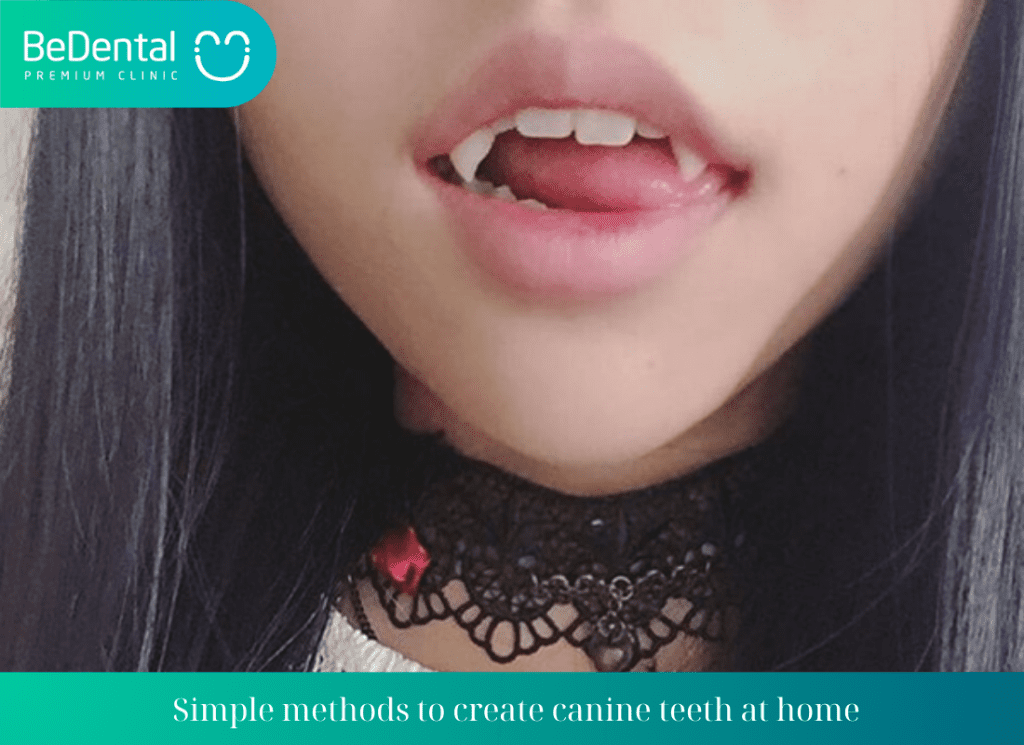
Preparation: Fake nails or white drinking straws, dental wax, specialized tooth adhesive.
Procedure: Cut the fake nails or drinking straws into the shape of canines teeth, with desired length and width suitable for the third tooth (counting from the front). Use specialized tooth adhesive to attach the fake canines teeth to your real teeth. Hold the fake teeth in place for 20 seconds to allow the adhesive to dry.
With this method, you can achieve natural-looking canines teeth without spending too much money. However, the lifespan of the fake canines teeth may not be long. Therefore, you can use them for parties with friends, costume parties, etc.
Creating beautiful canine teeth at a dental clinic.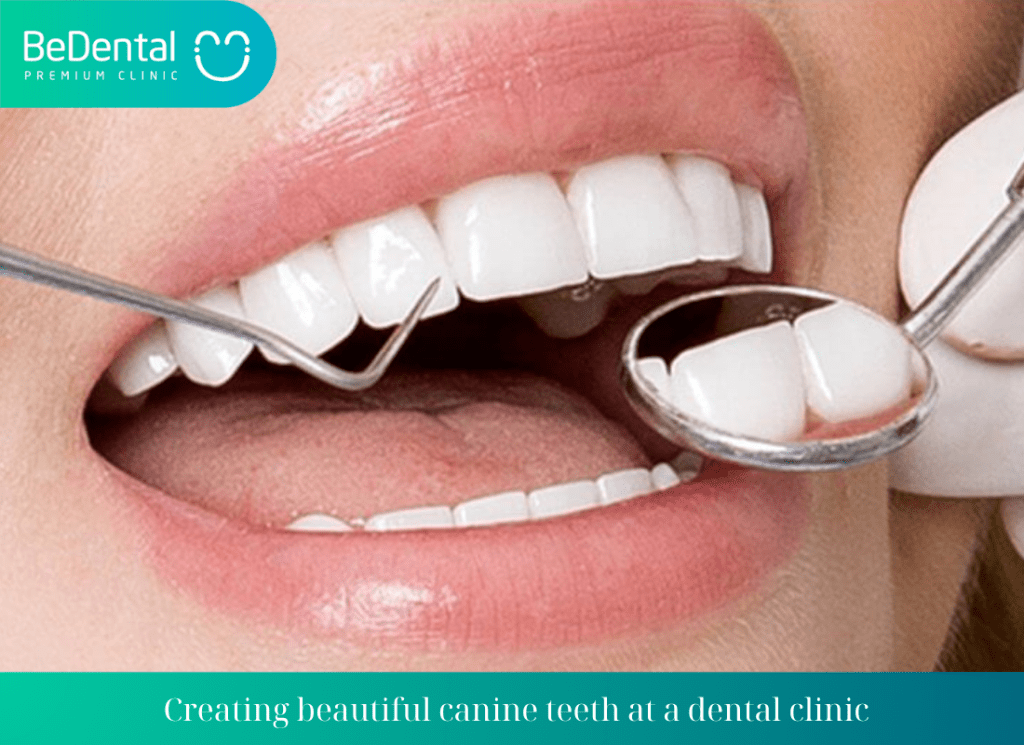
Below are some image of canine teeth at BeDental:
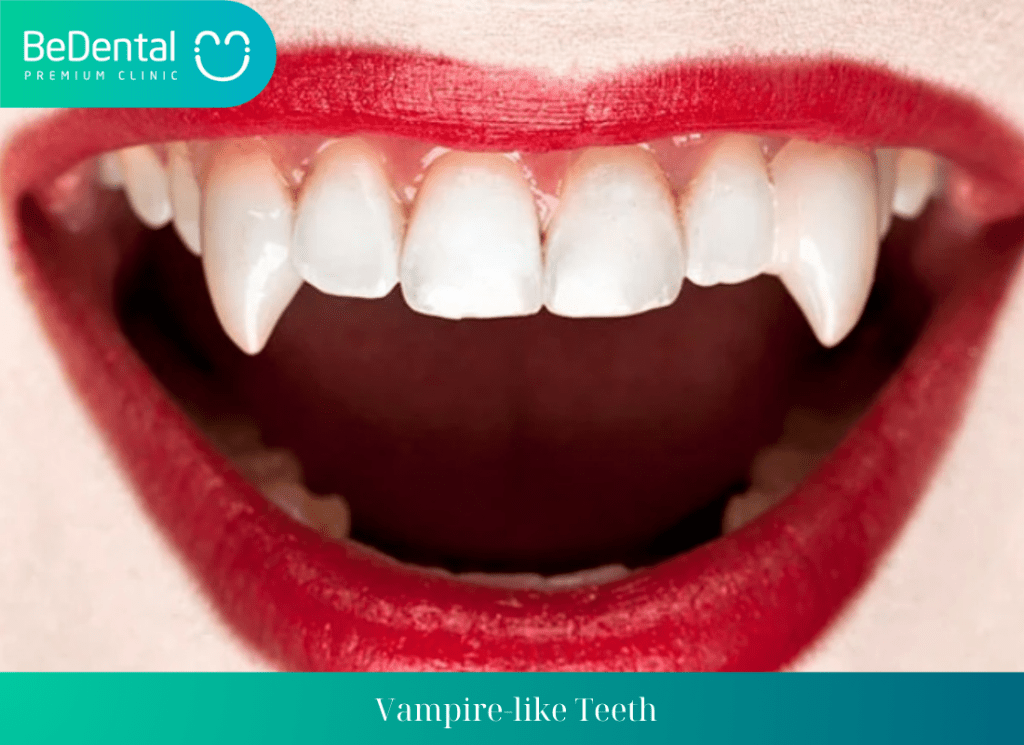
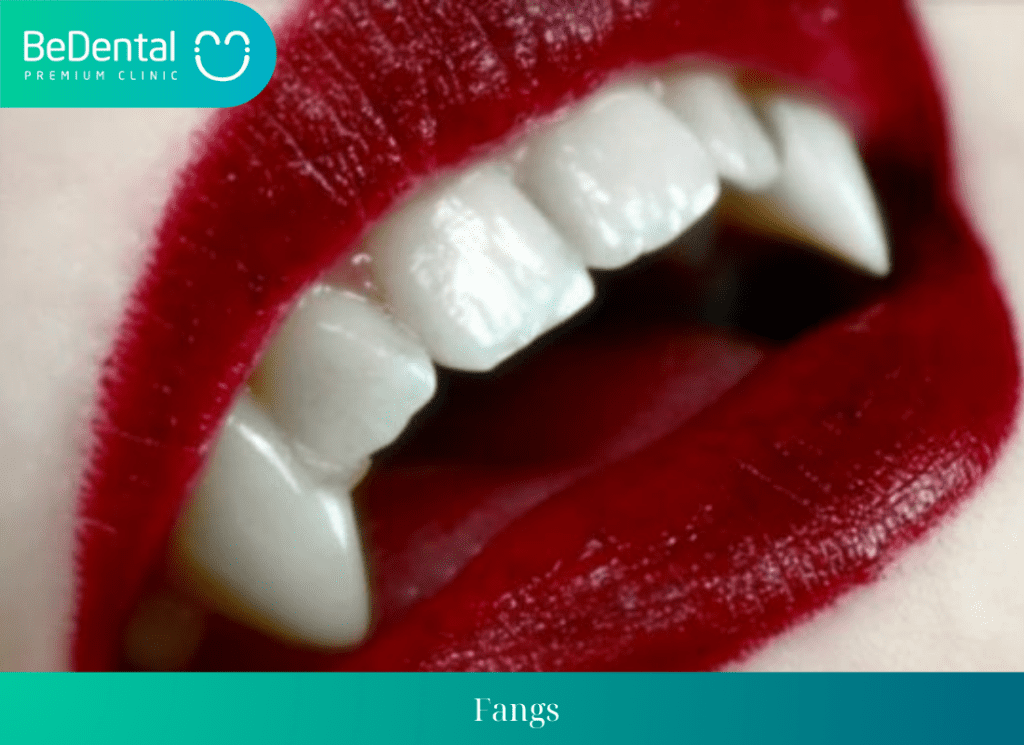
If you want to have beautiful, safe, and durable canine teeth, you can visit a dental clinic for consultation and treatment. Some methods that dental clinics can apply for clients who want to have canine teeth include:
- Creating canines teeth using composite material
- Applying porcelain veneers for canines teeth
- Implanting canines teeth using Implant technology
Conclusion
To receive more specific advice on canines teeth and how to achieve beautiful and aesthetic results without pain or high costs, please contact BeDental!
Tư vấn chuyên môn bài viết:
BÁC SĨ DƯƠNG THỊ THÙY NGA
BEDENTAL - TOP STANDARD DENTISTRY SYSTEM
In HANOI
Address 1: 7B Thi Sach St, Ngo Thi Nham, Hai Ba Trung Dist, Ha Noi. - 0934.61.9090
Address 2: No 129 Hoang Ngan, Yen Hoa, Cau Giay Dist, Ha Noi. - 0934.61.9090
In HO CHI MINH
Address 1: 53 -55 -57 Pho Duc Chinh St, Nguyen Thai Binh, Dist. 1, Ho Chi Minh. - 0766.00.8080
Working: 9am - 8pm everyday
Website: https://bedental.vn/en/
PLEASE LEAVE YOUR INFORMATION IF YOU WANT FURTHER DENTAL CONSULTATION





